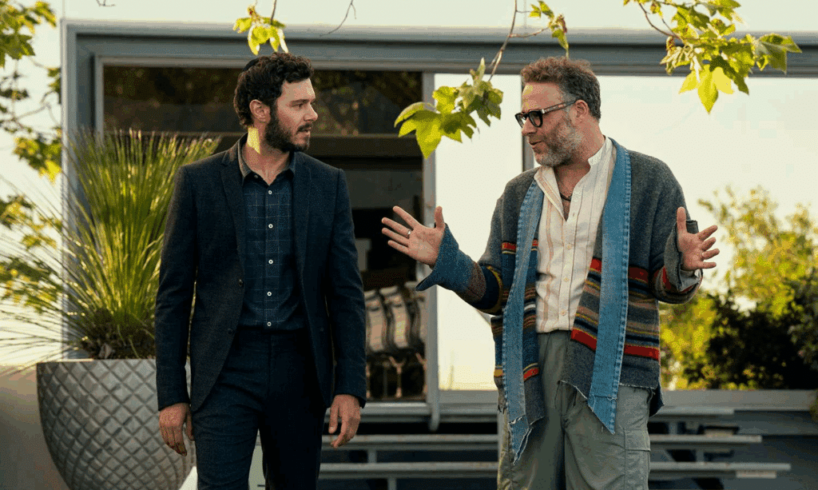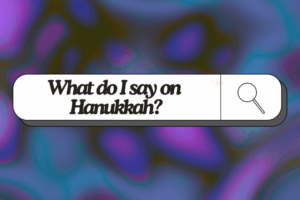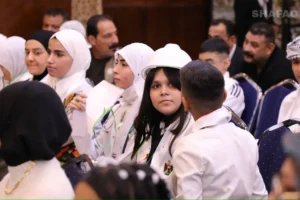
Last year’s Netflix breakout hit, “Nobody Wants This,” returned on October 23 with its second season: 10 entertaining and bingeable episodes that viewers can finish faster than a typical Passover seder. In many ways, keeping the series (and its depiction of American Jewish life) short and surface-level was the point.
I have plenty of opinions about this series because I live in the world it depicts. I am a concierge rabbi who literally goes by the alias “HotRabbi” on TikTok and @MyHotRabbi on Instagram. My memoir, “Confessions Of A Female Rabbi: Relevant Religion In An On-demand World,” explores the problems facing American Judaism and why more and more Jews are choosing creative ways to express their religiousness outside of synagogue walls.
Frankly, I found real issues with “Nobody Wants This” Season 1 — namely, its issues with Jewish representation. Jewish women were drawn as frigid and shrew-like. Rabbis like me were unrealistically depicted as spineless. In an open letter published over Rosh Hashanah last year, I implored the show’s creator, Erin Foster, to make teshuva, to look inward and improve her portrayal of the community she had always been welcomed by and with which she had intentionally decided to braid her life through conversion.
To Foster’s credit, there were improvements in Season 2. The Jewish women this time around were more nuanced and had moments of softness. Tovah Feldshuh’s matriarch, Bina, ultimately invites her son’s non-Jewish girlfriend to join family events and is even open to meeting her potential future non-Jewish in-laws. Jackie Tohn’s Esther, once a one-note schemer, now has tearful moments and depth, feeling lost and unhappy in her marriage. She is no longer working to separate hot rabbi Noah (Adam Brody) and Joanne (Kristen Bell). Esther offers advice, attends dinner parties, and tries — sometimes desperately — to be fun and a good friend while struggling. And now we understand Rebecca (Emily Arlook), Noah’s ex from Season 1; once a hysterical caricature of a vindictive former girlfriend, she’s redeemed as someone who was love-bombed, misled, and then blindsided by a breakup. This is progress.
Still, the show’s blind spots persist in its depiction of American Jewish life. For a series watched by tens of millions, I’m still disappointed and concerned. Seasons 1 and 2 were released a year apart, during the fever-pitch rise of antisemitism in this country. In April 2025, the Los Angeles County Commission on Human Relations reported a 153% spike in incidents targeting Jewish people in 2024, with 90% of all religiously motivated hate incidents targeting the Jewish community. Data released by the FBI in August 2025 revealed that nationally, anti-Jewish hate crimes accounted for nearly 70% of all religion-based hate crimes in 2024. Understandably, it is a fearful time — not just to be Jewish, but to choose Judaism in L.A. or the U.S..
Read more: Love, laughter, and a little Lashon Hara anchors ‘Nobody Wants This’ Season 2: review
If you have ever attended a Jewish gathering — a Shabbat dinner, a synagogue service, or even just a casual hangout with a rabbi — the topics of antisemitism, Israel, the hostages still in Gaza, and politics will come up. Depicting the topical dilemma of interfaith dating without the context of the angst, fear, and struggle the world’s Jewry is experiencing today is both incomplete and unfair.
“Nobody Wants This” reduces Jewishness to simply saying “poo, poo, poo” around superstitions or enjoying challah at Friday night dinners. It makes the rabbinate relevant only as a source of wisdom for relationship advice, not discussing the actual work clergy does. “Nobody Wants This” ignores the legitimate concerns of Jewish families and their allies.
Nobody Wants This. Adam Brody as Noah in episode 101 of Nobody Wants This. Cr. Stefania Rosini/Netflix © 2024
Jews care deeply about the world they live in. They discuss it all the time, especially with clergy. And rabbis give timely teachings from the Torah and Talmud to help their congregants make sense of antisemitism or find actionable ways to combat it. “Nobody Wants This” mentioned the concept of viral sermons. Well, the viral sermons of American rabbis have been about current events, most recently with Park Avenue Synagogue Senior Rabbi Elliot Cosgrove warning New York Jews about the threat of Mayoral candidate Zohran Mamdani. Throughout history, rabbis have spoken about the conflicts facing their parishioners, helped navigate the headlines of the moment through Jewish teachings, and have gotten involved in the causes that matter to their communities most. Now, many wear dog tags or yellow ribbons to support Israeli hostages captured on October 7, even when they are socializing outside of the synagogue. Their religious identity, yarmulke, and pins are part of who they are — unlike Rabbi Noah, who only wears his identifiable garb when he’s performing his job.
The glaring absence of pertinent current events in a would-be-relevant rom-com reveals the Hollywood bubble in which Netflix wishes to keep its Jewish characters. The streaming network’s mandate is to portray Jews with their specific gaze: either as “victim Jews of the past” (hence the glut of Holocaust content) or “fallen Jews” escaping their oppressive religious lives (with series like “Unorthodox” or “My Unorthodox Life”).
Host of People Jew Wanna Know Podcast, Margarita Lyadova, put it best in her review of the new season: “’Nobody Wants This’ is a show about the Jews everyone wishes we were; the lovable, easy, convenient Jews. Jews who are flexible and don’t push back. Jews who don’t have greater responsibilities or concerns over their own people. Jews that fit right in… [‘Nobody Wants This’] is the pathetic wet dream of some bagel-and-lox-Jew with internalized antisemitism and a desire to fit into Hollywood.”
I couldn’t agree more.
“My job is to safeguard Jewish tradition and steward a community towards meaningful practice and expression of Jewishness,” Rabbi Rebecca Keren Jablonski writes (courtesy)
In case you didn’t know, being a rabbi is thrilling. While working with hundreds of individuals and families through life’s most precious milestones, my job is to safeguard Jewish tradition and steward a community towards meaningful practice and expression of Jewishness.
Yet, in “Nobody Wants This,” the clergy at Temple Chai are either cringy, competitive, or just interested in their lunch orders. The more progressive Temple Ahava’s senior rabbi, played by Seth Rogen, seems like a stoned ex-Burner, more concerned with his celebrity congregants and interfaith optics than substantive services or meaningful Jewish facilitation. Temple Ahava serves as a foil to remind Rabbi Noah that he’s unwilling to abandon mainstream Judaism. He’s not that kind of rabbi, but we never actually see what kind of rabbi he is.
That disconnect bleeds into his relationship with Joanne. I’m not sure how to reconcile his Jewish commitment with their anemic relationship. For a couple supposedly navigating a conversion and blending their lives, they do shockingly little that is recognizably Jewish. Noah peppers in Jewish teachings, but where’s the lived practice? We get challah on Shabbat and a drunk, irreligious Purim party. Where is the volunteer work? Or Torah study?
Nobody Wants This. (L to R) Adam Brody as Noah, Kristen Bell as Joanne in episode 203 of Nobody Wants This. Cr. Erin Simkin/Netflix © 2025
There’s one more group of people this show manages to offend: the non-Jewish but genuinely curious partners of Jews. I know and work with so many interfaith couples. Their non-Jewish partners take Judaism seriously. They are supportive, careful, and respectful of traditions. They Google what to expect at Shabbat dinners, and out of an abundance of consideration, would never use a phone at the table like Joanne does. They contemplate how they would blend Christmas and Santa with Hanukkah on the first few dates — not deep into a relationship. They worry their potential children might be exposed to antisemitism. They try. They err on the side of respect when it comes to family and work events. Even my Jewish husband treads lightly at my work events; he would never feel so comfortable as to snoop around one of my private clients’ homes the way Joanne does. And she isn’t even secure in her relationship when she does it. For all the talk about being in a mature, equal partnership, Joanne rarely behaves like someone ready to show up for a partner’s identity, family, or community.
And it’s not just Joanne. Every relationship in this season is toxic and defined by self-interest in some way. Couples talk at each other, not to each other. They lack deep knowledge of one another, shared values, emotional depth, and commitment. That could be why so many seem doomed to fail. Sharing values with a non-Jewish partner is possible, whether or not they convert. A rabbi, who obviously cares about Jewish values, would be sooner turned off by all of these deep, unresolved rifts between him and his partner. I say this from experience: I initially met my husband at a Shabbat dinner 15 years before we ever dated; our friendship, rooted in a shared love of culture and charity work, brought us closer together.
Two seasons in, I’m still unsure what the unbreakable bond is between Noah and Joanne; what makes them soulmates is still a mystery. Perhaps Season 3 will illuminate this and further develop the show’s relationships. Concerning Jewish life and those who choose a Jewish path, I hope the show will use an ayin tovah, a more favorable perspective – after all, Rabbi Noah mentions the concept in Episode 10. Poo, poo, poo.





